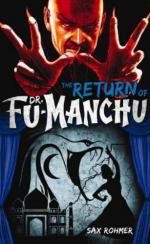“Oh, God!” whispered Smith.
A faint puff of wind extinguished the match.
In all my surgical experience I had never met with anything quite so horrible. Forsyth’s livid face was streaked with tiny streams of blood, which proceeded from a series of irregular wounds. One group of these clustered upon his left temple, another beneath his right eye, and others extended from the chin down to the throat. They were black, almost like tattoo marks, and the entire injured surface was bloated indescribably. His fists were clenched; he was quite rigid.
Smith’s piercing eyes were set upon me eloquently as I knelt on the path and made my examination—an examination which that first glimpse when Forsyth came staggering out from the trees had rendered useless— a mere matter of form.
“He’s quite dead, Smith,” I said huskily. “It’s—unnatural—it—”
Smith began beating his fist into his left palm and taking little, short, nervous strides up and down beside the dead man. I could hear a car humming along the highroad, but I remained there on my knees staring dully at the disfigured bloody face which but a matter of minutes since had been that of a clean looking British seaman. I found myself contrasting his neat, squarely trimmed mustache with the bloated face above it, and counting the little drops of blood which trembled upon its edge. There were footsteps approaching. I stood up. The footsteps quickened; and I turned as a constable ran up.
“What’s this?” he demanded gruffly, and stood with his fists clenched, looking from Smith to me and down at that which lay between us. Then his hand flew to his breast; there was a silvern gleam and—
“Drop that whistle!” snapped Smith—and struck it from the man’s hand. “Where’s your lantern? Don’t ask questions!”
The constable started back and was evidently debating upon his chances with the two of us, when my friend pulled a letter from his pocket and thrust it under the man’s nose.
“Read that!” he directed harshly, “and then listen to my orders.”
There was something in his voice which changed the officer’s opinion of the situation. He directed the light of his lantern upon the open letter and seemed to be stricken with wonder.
“If you have any doubts,” continued Smith—“you may not be familiar with the Commissioner’s signature—you have only to ring up Scotland Yard from Dr. Petrie’s house, to which we shall now return, to disperse them.” He pointed to Forsyth. “Help us to carry him there. We must not be seen; this must be hushed up. You understand? It must not get into the press—”
The man saluted respectfully; and the three of us addressed ourselves to the mournful task. By slow stages we bore the dead man to the edge of the common, carried him across the road and into my house, without exciting attention even on the part of those vagrants who nightly slept out in the neighborhood.




